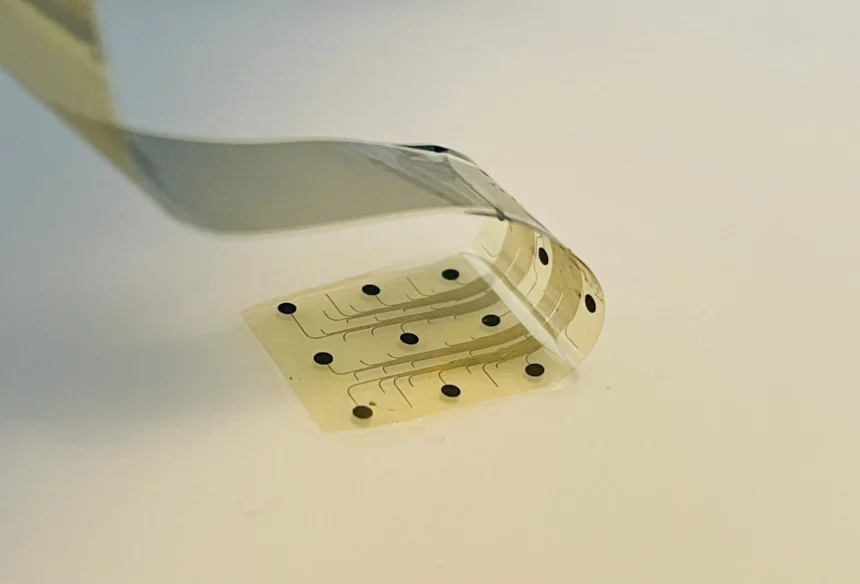A Spain-based startup has achieved a significant milestone by demonstrating the efficacy of its graphene-based brain-computer interface (BCI) in enabling precise tumor surgeries.
INBRAIN Neuroelectronics, a company focused on developing advanced brain-computer interface therapies, successfully implanted its cortical interface into a human patient, marking a notable advancement in the field of neurotechnology.
As per the press statement, this is the “world’s first human procedure of its cortical interface in a patient undergoing brain tumor resection.”
Notably, this BCI technology demonstrated the ability to distinguish between healthy and cancerous brain tissue at a microscopic level. The surgical procedure was carried out at Salford Royal Hospital in Manchester, UK, further highlighting the clinical potential of this advanced neurotechnology.
“The world’s first human application of a graphene-based BCI highlights the transformative impact of graphene-based neural technologies in medicine. This clinical milestone opens a new era for BCI technology, paving the way for advancements in both neural decoding and its application as a therapeutic intervention,” said Carolina Aguilar, CEO and Co-Founder of INBRAIN Neuroelectronics.

The device utilizes graphene, an extraordinary material known for its exceptional properties. Graphene-based materials are composed of a single layer of carbon atoms, offering an unparalleled combination of strength and thinness. Its unique electrical conductivity and mechanical resilience make graphene an ideal candidate for neural interface applications.
“We are capturing brain activity in areas where traditional metals and materials struggle with signal fidelity. Graphene provides ultra-high density for sensing and stimulating, which is critical to conduct high precision resections while preserving the patient’s functional capacities, such as movement, language or cognition,” said Dr. David Coope, the neurosurgeon who performed the procedure.
After extensive testing and development, the company announced the commencement of human trials in July 2024. The trial will involve 8 to 10 patients and is designed to evaluate the safety of graphene when in direct contact with the human brain, marking a critical step in the clinical validation of this innovative technology.
“The study will also aim to demonstrate graphene’s superiority over other materials in decoding brain functionality in both awake and asleep states,” said Kostas Kostarelos, Co-Founder of INBRAIN Neuroelectronics.
The company has integrated graphene, artificial intelligence (AI), and advanced semiconductor technology to develop a novel form of BCI therapy, designed to be minimally invasive.
Additionally, the BCI-Tx platform leverages graphene to enable high-resolution brain signal recording, supporting what the company describes as “adaptive neuroelectronic therapy,” aimed at delivering more precise and responsive neurological interventions.
The device is also capable of detecting specific patterns in brain activity, referred to as biomarkers, which are linked to various neurological conditions. This capability holds potential for both diagnosing and monitoring the progression of these diseases.
According to the company’s press release, the platform is further designed to precisely stimulate targeted regions of the brain, including both cortical and subcortical structures, to facilitate “neural network rebalancing,” offering promising therapeutic applications for neurological disorders.
“INBRAIN is at the forefront of precision neurology, integrating BCI decoding with high-precision neuromodulation to restore function and alleviate symptoms, delivering continuous, personalized treatment to maximize benefits while minimizing side effects,” Aguilar noted.
The company proposes that this brain implant could offer substantial benefits to individuals suffering from Parkinson’s disease. INBRAIN highlights that approximately 30% of the global population is affected by neurological disorders, underscoring the potential impact of this technology in addressing widespread neurological conditions.
Several companies, including Elon Musk’s Neuralink, have been actively engaged in the development of brain-computer interface (BCI) technology.
In recent years, BCIs have facilitated significant advancements in medical diagnostics, improved communication for individuals with speech impairments, and enabled the control of external devices, such as robotic limbs, through the recording and interpretation of brain signals. These innovations demonstrate the broad potential of BCIs across various fields of medicine and neurotechnology.


